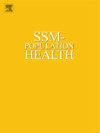单身家庭的抑郁症状:饮食习惯的作用和与他人一起吃饭的频率
IF 3.1
2区 医学
Q1 PUBLIC, ENVIRONMENTAL & OCCUPATIONAL HEALTH
引用次数: 0
摘要
全球单身家庭的流行正在迅速增加。然而,越来越多的证据表明,独居者出现抑郁症状的风险更大。因此,本研究旨在探讨饮食质量和饮食陪伴在家庭类型与抑郁症状关系中的中介作用。分析了2016年、2018年和2020年韩国国民健康与营养调查的数据,其中包括13357名年龄≥20岁的参与者。通过患者健康问卷-9 (PHQ-9)、韩国健康饮食指数的饮食质量和单独用餐频率的饮食陪伴来测量抑郁症状。进行了逻辑回归和因果中介分析,调整了人口统计和社会经济变量。采用加权抽样,以保证全国代表性。在所有年龄组中,与多人家庭相比,单人家庭的个体出现轻至重度(PHQ-9≥5)和中度至重度(PHQ-9≥10)抑郁症状的几率显著高于多人家庭。较低的饮食质量和较高的单独进食频率与抑郁症状的增加显著相关。因果中介分析表明,饮食质量分别占轻度至重度和中度至重度抑郁症状关联的8.4%和10.7%,而单独进食的频率分别占30.3%和38.5%。不良的饮食质量和频繁的单独进食介导了独居和抑郁症状之间的关联。鼓励健康饮食习惯和促进共享用餐时间的公共卫生干预措施可能有助于减轻越来越多的独居者的抑郁症状。本文章由计算机程序翻译,如有差异,请以英文原文为准。
Depressive symptoms among single-person households: roles of dietary habits and frequency of eating meals with others
The global prevalence of single-person households is rapidly increasing. However, emerging evidence indicates that individuals living alone are at greater risk of experiencing depressive symptoms. Therefore, this study aims to investigate the mediating roles of dietary quality and eating companionship in the relationship between household type and depressive symptoms. Data from the 2016, 2018, and 2020 Korean National Health and Nutrition Examination Survey were analyzed, comprising 13,357 participants aged ≥20 years. Depressive symptoms were measured using the Patient Health Questionnaire-9 (PHQ-9), dietary quality with the Korean Healthy Eating Index, and eating companionship through the frequency of eating alone. Logistic regression and causal mediation analyses were performed, adjusting for demographic and socioeconomic variables. Sampling weights were applied to ensure national representativeness. Individuals in single-person households exhibited significantly higher odds of experiencing mild-to-severe (PHQ-9 ≥5) and moderate-to-severe (PHQ-9 ≥10) depressive symptoms compared with those in multi-person households across all age groups. Lower dietary quality and a higher frequency of eating alone were significantly associated with increased depressive symptoms. Causal mediation analysis indicated that dietary quality accounted for 8.4 % and 10.7 % of the associations with mild-to-severe and moderate-to-severe depressive symptoms, respectively, while the frequency of eating alone mediated 30.3 % and 38.5 % of these associations. Poor dietary quality and frequent solitary eating mediate the association between living alone and depressive symptoms. Public health interventions that encourage healthier eating habits and promote shared mealtimes may help alleviate depressive symptoms among the increasing population of individuals living alone.
求助全文
通过发布文献求助,成功后即可免费获取论文全文。
去求助
来源期刊

Ssm-Population Health
PUBLIC, ENVIRONMENTAL & OCCUPATIONAL HEALTH-
CiteScore
6.50
自引率
2.10%
发文量
298
审稿时长
101 days
期刊介绍:
SSM - Population Health. The new online only, open access, peer reviewed journal in all areas relating Social Science research to population health. SSM - Population Health shares the same Editors-in Chief and general approach to manuscripts as its sister journal, Social Science & Medicine. The journal takes a broad approach to the field especially welcoming interdisciplinary papers from across the Social Sciences and allied areas. SSM - Population Health offers an alternative outlet for work which might not be considered, or is classed as ''out of scope'' elsewhere, and prioritizes fast peer review and publication to the benefit of authors and readers. The journal welcomes all types of paper from traditional primary research articles, replication studies, short communications, methodological studies, instrument validation, opinion pieces, literature reviews, etc. SSM - Population Health also offers the opportunity to publish special issues or sections to reflect current interest and research in topical or developing areas. The journal fully supports authors wanting to present their research in an innovative fashion though the use of multimedia formats.
 求助内容:
求助内容: 应助结果提醒方式:
应助结果提醒方式:


